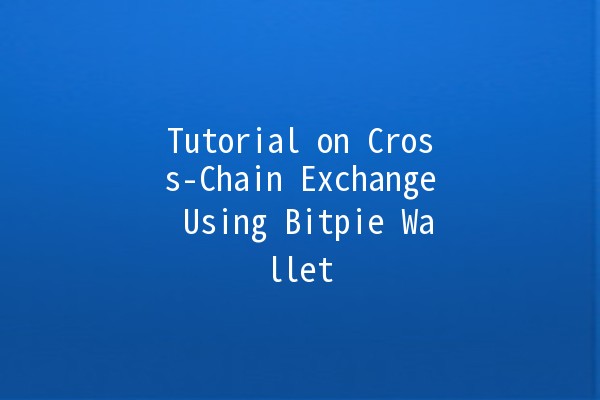
In the everevolving world of cryptocurrency, the demand for seamless transactions across multiple blockchain platforms has surged. Bitpie Wallet, known for its userfriendly interface and robust security features, provides a convenient solution for users looking to execute crosschain exchanges. In this tutorial, we’ll delve into the process of using Bitpie Wallet for crosschain exchanges, discussing practical tips and best practices along the way.
Understanding CrossChain Exchanges
Crosschain exchanges allow users to swap cryptocurrencies across different blockchain networks without the need for a centralized intermediary. This functionality is essential for users who wish to trade tokens that are not on the same blockchain, benefiting from better liquidity and opportunities across diverse markets.
Benefits of CrossChain Exchanges

Getting Started with Bitpie Wallet 🌟
To facilitate crosschain exchanges, the first step is to download and set up the Bitpie Wallet. This digital wallet supports multiple cryptocurrencies and provides essential tools for secure transactions.
Downloading and Setting Up Bitpie Wallet
Steps to Execute CrossChain Exchanges
Before engaging in crosschain exchanges, ensure that your Bitpie wallet is adequately funded with the cryptocurrencies you intend to trade.
Deposit Method: You can transfer coins from another wallet or purchase them directly within the Bitpie interface.
Bitpie Wallet employs various decentralized protocols for crosschain exchanges, such as Atomic Swaps and decentralized exchanges (DEXs).
Atomic Swaps: Allow peertopeer transactions without thirdparty involvement, leveraging smart contracts for security.
DEXs: For more extensive trading options, you might want to connect with decentralized exchanges that offer crosschain capabilities.
Increasing Productivity with Practical Tips
Example: Use platforms like CoinMarketCap or CoinGecko to monitor market trends.
Example: If you notice that Ethereum's gas fees are unusually high, consider waiting or using a different blockchain until fees are lower.
Example: Using alerts on trading platforms like TradingView to notify you when prices hit your desired level.
Example: If you expect the price of Bitcoin to drop, set a limit order to exchange when it reaches that level.
Example: Use authentication apps like Google Authenticator instead of SMS for better security.
Potential Issues and Solutions in CrossChain Exchanges
Slow Transactions
One common issue in crosschain exchanges is slow transaction times. Factors that contribute to this include network congestion and lower liquidity for the tokens being exchanged.
Solution: Choose trading times when networks are less congested and ensure to exchange tokens that have better market liquidity.
High Fees
Depending on the blockchain involved, users might face unexpectedly high fees.
Solution: Always check the fees associated with each transaction and, if necessary, consider alternative blockchains with lower fees.
Smart Contract Risks
Interacting with smart contracts poses inherent risks as they may be vulnerable to bugs and exploits.
Solution: Stick to wellaudited protocols and exchanges, and stay updated on any alerts or vulnerabilities related to the specific platforms you utilize.
Common Questions
What Is CrossChain Technology?
Crosschain technology enables the interaction between different blockchain networks. It facilitates the transfer of data and assets across different chains, removing the need for centralized exchanges.
How Does Bitpie Wallet Ensure Security?
Bitpie Wallet secures user funds through private keys, requiring the owner’s consent for transactions while also implementing advanced encryption protocols for data protection.
How Can I Keep My Bitpie Wallet Secure?
To enhance the security of your Bitpie Wallet, regularly update your software, enable twofactor authentication, and keep backup recovery phrases in a secure location.
What Cryptocurrencies Does Bitpie Wallet Support?
Bitpie Wallet supports a wide range of cryptocurrencies, including Bitcoin, Ethereum, and various altcoins, enabling users to engage in diverse trading opportunities.
Are CrossChain Exchanges Fast?
The speed of crosschain exchanges can vary based on network congestion and the specific blockchain. Generally, they are efficient but may be slower than singlechain transactions.
Can I Use Bitpie Wallet Without Internet Access?
While you can view your wallet balance and transaction history offline, executing transactions requires internet access due to the nature of blockchain technology.
With our indepth exploration of using the Bitpie Wallet for crosschain exchanges, you now have the knowledge and tools to navigate this exciting landscape of cryptocurrency trading. Remember to stay informed about market trends, keep your assets secure, and select the best times for your transactions to maximize your trading effectiveness. Happy exchanging!

